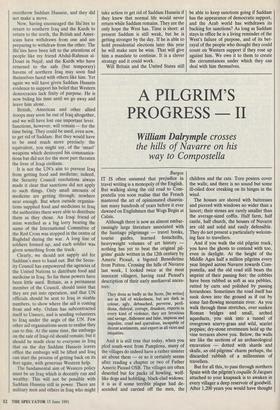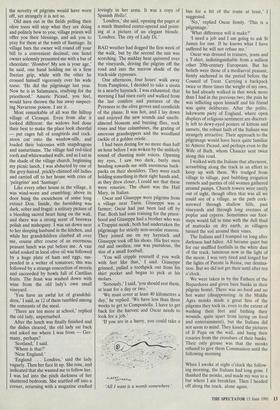A PILGRIM'S PROGRESS II
William Dalrymple crosses
the hills of Navarre on his way to Compostella
Burgos IT IS often assumed that prejudice in travel writing is a monopoly of the English. But walking along the old road to Com- postella you soon realise that the French mastered the art of opinionated chauvin- ism many hundreds of years before it ever dawned on Englishmen that Wogs Begin at Calais.
Although there is now an almost embar- rassingly large literature associated with the Santiago pilgrimage — travel books, tourist guides, learned festschrifts, heavyweight volumes of art history — nothing has yet to beat the original pil- grims' guide written in the 12th century by Americ Picaud, a bigoted Benedictine from Poitou. Crossing the hills of Navarre last week, I looked twice at the most innocent villagers, having read Picaud's description of their early mediaeval ances- tors:
They dress as badly as the Scots, [he writes] are as full of wickedness, but are dark in colour, ugly, debauched, perverse, perfi- dious, disloyal, corrupt, drunken, experts in every kind of violence; they are ferocious and savage, dishonest and false, impious and impolite, cruel and querulous, incapable of decent sentiments, and expert in all vices and iniquities.
And it is still true that today, when you plod south-west from Pamplona, many of the villages do indeed have a rather sinister air about them — or so it certainly seems after reading a chapter or two of Father Americ Picaud OSB. The villages are often deserted but for packs of howling, wolf- like dogs and hobbling, black-clad widows: it is as if some terrible plague had de- scended and carried off the men, the children and the cats. Torn posters cover the walls; and there is no sound but some ill-oiled door creaking on its hinges in the wind.
The houses are shored with buttresses and pierced with windows no wider than a lancet; their stones are rarely smaller than the average-sized coffin. Half farm, half castle, half church, the houses of Navarre are old and solid and easily defensible. They do not present a particularly welcom- ing face to travellers.
And if you walk the old pilgrim track, you have the ghosts to contend with too, even in daylight. At the height of the Middle Ages half a million pilgrims every year limped across Navarre towards Com- postella, and the old road still bears the imprint of their passing feet: the cobbles have been rubbed as soft as sea pebbles, rutted by carts and polished by passing horseshoes. Sometimes the road itself has sunk down into the ground as if cut by some fast-flowing mountain river. As you walk through these stretches, over sunken Roman bridges and small, arched aqueducts, you sink into a tunnel of overgrown scurvy-grass and wild, scarlet poppies; dry-stone revetments hold up the vine terraces above you. Below, the walls are like the sections of an archaeological excavation — dotted with shards and skulls, an old pilgrims' charm perhaps, the discarded rubbish of a millennium of travellers.
But for all this, to pass through northern Spain with the pilgrim's coquille St Jacques attached to your knapsack is to awaken in every villager a deep reservoir of goodwill. After 1,200 years you would have thought the novelty of pilgrims would have worn off, yet strangely it is not so.
Old men out in the fields polling their olive trees will stop what they are doing and politely bow to you; village priests will offer you their blessings, and ask you to pray for them at the tomb of Santiago. In village bars the owner will round off your bill to a convenient decimal; one hotel owner solemnly presented me with a bar of chocolate: 'Hombre! My son is your age,' he said, one hand holding me in a firm Iberian grip, while with the other he crossed himself vigorously over his wide torso. 'He did the pilgrimage last year. Now he is in Salamanca, studying for the priesthood.' Americ Picaud, you feel, would have thrown the bar away suspect- ing Navarrese poison. I ate it.
Most remarkable of all was the hilltop village of Cirauqui. Even from afar it looked different: the widows had done their best to make the place look cheerful — put cages full of songbirds and cock- atoos out onto the window-sills, and loaded their balconies with snapdragons and nasturtiums. The village had red-tiled roofs and whitewashed walls, and as I sat in the shade of the village church, beginning my picnic lunch, I was abducted by one of the grey-haired, prickly-chinned old ladies and carried off to her house with cries of `pelegrino' and 'Santiago'.
Like every other house in the village, it was wind-worn and crumbling; above its door hung the escutcheon of some long extinct Don. Inside, the furnishing was dark, sober and frugal: a solitary picture of a bleeding sacred heart hung on the wall, and there was a strong scent of beeswax polish and mahogany. I was sat down next to her sleeping husband in the kitchen, and while her grandchildren climbed all over me, course after course of an enormous peasant lunch was put before me. A vast salad soaked in local olive oil was followed by a huge plate of ham and eggs, sus- pended in a welter of tomatoes; this was followed by a strange concoction of morels and succeeded by bowls full of Castilian fruits. The feast was washed down with wine from the old lady's own small vineyard.
'You have an awful lot of grandchil- dren,' I said, as 12 of them tumbled among the remnants of the meal.
'There are ten more at school,' replied the old lady, unperturbed.
After the lunch was finally finished and the dishes cleared, the old lady sat back and asked me where I was from — Ger- many, perhaps?
'Scotland,' I said.
'Where is that?'
'Near England.'
'England . . . Londres,' said the lady vaguely. Then her face lit up. She rose, and indicated that she wanted me to follow her. I was led into the pitch darkness of her shuttered bedroom. She scuttled off into a corner, returning with a magazine cradled lovingly in her arms. It was a copy of Spanish Hello!.
`Londres,' she said, opening the pages at a much thumbed centre-spread and point- ing at a picture of an elegant blonde. `Londres. The city of Lady Di.'
BAD weather had dogged the first week of the walk, but by the second the sun was scorching. The midday heat quivered over the vineyards, driving the pilgrim off the road and into the narrow shade of the track-side cypresses.
One afternoon, four hours' walk away from Pamplona, I decided to take a siesta in a nearby haystack. I was exhausted: that morning I had risen early and walked from the last conifers and pastures of the Pyrenees to the olive groves and cornfields of the plains. It was hot, and I lay down and enjoyed the new sounds and smells: almond blossom and buzzing flies, rock roses and blue columbines, the grating of amorous grasshoppers and the woodland cackle of a golden oriole.
I had been dozing for no more than half an hour before I was woken by the unlikely sound of chanting male voices. Opening my eyes, I saw two dark, burly men heading towards me with enormous back- packs on their shoulders. They were each holding something in their right hands and, as they drew closer, I could see that these were rosaries. The chant was the Hail Mary, in Italian.
Oscar and Giuseppe were pilgrims from a village near Turin. Giuseppe was a farmer; Oscar had just been laid off by Fiat. Both had sons training for the priest- hood and Giuseppe had a brother who was a Trappist monk; both had undertaken the pilgrimage for strictly non-secular reasons. They joined me on my haystack and Giuseppe took off his shoes. His feet were red and swollen; one was pustulous, the size of a small football.
'You will cripple yourself if you walk with feet like that,' I said. Giuseppe grinned, pulled a toothpick out from his shirt pocket and began to pick at his molars.
'Seriously,' I said, 'you should rest them, at least for a day or two.'
'We must cover at least 40 kilometres a day,' he replied. 'We have less than three weeks to get to Compostella. I have to get back for the harvest and Oscar needs to look for a job.'
'If you are in a hurry, you could take a 'All I want is a womb somewhere.' bus for a bit of the route at least,' I suggested.
'No,' replied Oscar firmly. 'This is a pilgrimage.'
'What difference will it make?'
'I need a job and I am going to ask St James for one. If he knows what I have suffered he will not refuse me.'
Oscar was dressed in trainers, jeans and a T-shirt, indistinguishable from a million other 20th-century Europeans. But his beliefs were those of a mediaeval peasant, firmly anchored in the period before the Council of Trent. Carrying a backpack twice or three times the weight of my own, he had already walked in that week more than I had in the previous two; the pain he was inflicting upon himself and his friend was quite deliberate. After the polite, lukewarm piety of England, where open displays of religious sentiment are discreet- ly left to dewy-eyed posters of kittens and sunsets, the robust faith of the Italians was strangely attractive. Their approach to the pilgrimage would have been quite familiar to Americ Picaud, and perhaps even to the Wife of Bath, whom Chaucer sent twice along this road.
I walked with the Italians that afternoon, scrambling along the track in an effort to keep up with them. We trudged from village to village, past bubbling irrigation runnels and parties of old women gathered around pumps. Church towers were rarely out of sight, though often that was all we could see of a village, as the path cork- screwed through shallow hills, past vineyards and through long avenues of poplar and cypress. Sometimes our foot- steps would fall in time with the dull thud of mattocks on dry earth, as villagers turned the soil around their vines.
The Italians and I tramped on long after darkness had fallen. All became quiet but for our muffled footfalls in the white dust of the track, luminous now in the light of the moon. I was very tired and longed for the lights of Puente la Reina, our destina- tion. But we did not get their until after ten o'clock.
We were taken in by the Fathers of the Repardores and given bare bunks in their pilgrim hostel. There was no food and no hot water (disappointing: in the Middle Ages monks made a great fuss of the pilgrims they took in, even to the extent of washing their feet and bathing their wounds, quite apart from laying on food and entertainment), but the Italians did not seem to mind. They kissed the pictures of II Papa on the wall, and hung their rosaries from the crossbars of their bunks. Their only grouse was that the monks refused to give them Communion until the following morning.
When I awoke at eight o'clock the follow- ing morning, the Italians had long gone. I thanked the monks, and made my way to a bar where I ate breakfast. Then I headed off along the track, alone again.



















































 Previous page
Previous page